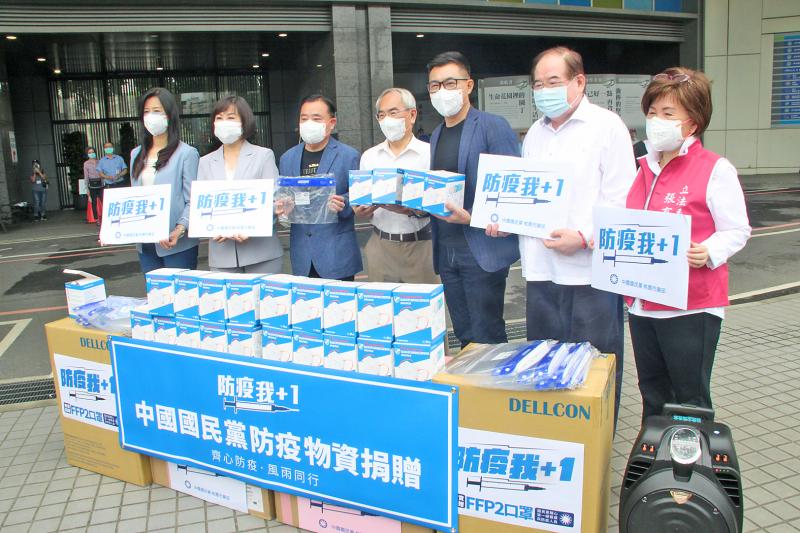The Chinese Nationalist Party (KMT) yesterday doubled down on its criticism of the government’s COVID-19 vaccine policy, saying it has failed to make adequate preparations for emerging variants.
Former KMT chairman Eric Chu (朱立倫) wrote on Facebook about the spread of the Delta, Delta-plus and other COVID-19 variants that are more infectious and resistant to vaccines than the Alpha variant that is dominant in Taiwan.
The outbreak that began last month shows that border controls alone cannot stop the virus’ spread, Chu wrote, adding that the nation’s reliance on foreign-donated vaccines and delays in shipments of its orders bode ill for the country.

Photo: Hsu Chuo-hsun, Taipei Times
“We have made no preparations to administer three [COVID-19] vaccine jabs or acquire second-generation vaccines,” he said. “Experts have recommended giving three shots.”
A study reported in a research letter on Wednesday in the New England Journal of Medicine said that administration of a third dose of the Pfizer–BioNTech COVID-19 vaccine “to solid-organ transplant recipients significantly improved the immunogenicity of the vaccine,” although it did not make a recommendation about mass inoculation.
Taiwan should pursue international COVID-19 vaccine contract manufacturing orders, purchase huge quantities of vaccines and develop second-generation vaccines domestically, Chu said.
Separately, asked about some KMT members’ description of Taiwan as a “vaccine beggar,” Representative to Japan Frank Hsieh (謝長廷) on Tuesday said it could dishearten the nation’s friends.
“Naturally, donors would feel that this is a setback; these countries would then reassess whether to provide further shipments,” he said.
KMT Chairman Johnny Chiang (江啟臣) yesterday accused the Democratic Progressive Party (DPP) of “politicizing pandemic policy.”
Foreign vaccine donations came at the expense of the “cries and lives of the nation’s citizens,” and are proof that the international community recognizes the incompetence of the government, Chiang said during a radio interview.
Hsieh was twisting facts and shifting blame when he should be demanding that President Tsai Ing-wen’s (蔡英文) administration obtain more internationally certified vaccines, he said.
The KMT supports Taiwan developing its own COVID-19 vaccines, but their safety should be backed by international certification, or Taiwan’s biotechnology industry would be damaged if locally made vaccines turn out to be problematic, he said.

Three Taiwanese airlines have prohibited passengers from packing Bluetooth earbuds and their charger cases in checked luggage. EVA Air and Uni Air said that Bluetooth earbuds and charger cases are categorized as portable electronic devices, which should be switched off if they are placed in checked luggage based on international aviation safety regulations. They must not be in standby or sleep mode. However, as charging would continue when earbuds are placed in the charger cases, which would contravene international aviation regulations, their cases must be carried as hand luggage, they said. Tigerair Taiwan said that earbud charger cases are equipped

Foreign travelers entering Taiwan on a short layover via Taiwan Taoyuan International Airport are receiving NT$600 gift vouchers from yesterday, the Tourism Administration said, adding that it hopes the incentive would boost tourism consumption at the airport. The program, which allows travelers holding non-Taiwan passports who enter the country during a layover of up to 24 hours to claim a voucher, aims to promote attractions at the airport, the agency said in a statement on Friday. To participate, travelers must sign up on the campaign Web site, the agency said. They can then present their passport and boarding pass for their connecting international

Temperatures in northern Taiwan are forecast to reach as high as 30°C today, as an ongoing northeasterly seasonal wind system weakens, the Central Weather Administration (CWA) said. CWA forecaster Tseng Chao-cheng (曾昭誠) said yesterday that with the seasonal wind system weakening, warmer easterly winds would boost the temperature today. Daytime temperatures in northern Taiwan and Yilan County are expected to range from 28°C to 30°C today, up about 3°C from yesterday, Tseng said. According to the CWA, temperature highs in central and southern Taiwan could stay stable. However, the weather is expected to turn cooler starting tonight as the northeasterly wind system strengthens again

Taiwan sweltered through its hottest October on record, the Central Weather Administration (CWA) said yesterday, the latest in a string of global temperature records. The main island endured its highest average temperature since 1950, CWA forecaster Liu Pei-teng said. Temperatures the world over have soared in recent years as human-induced climate change contributes to ever more erratic weather patterns. Taiwan’s average temperature was 27.381°C as of Thursday, Liu said. Liu said the average could slip 0.1°C by the end of yesterday, but it would still be higher than the previous record of 27.009°C in 2016. "The temperature only started lowering around Oct. 18 or 19